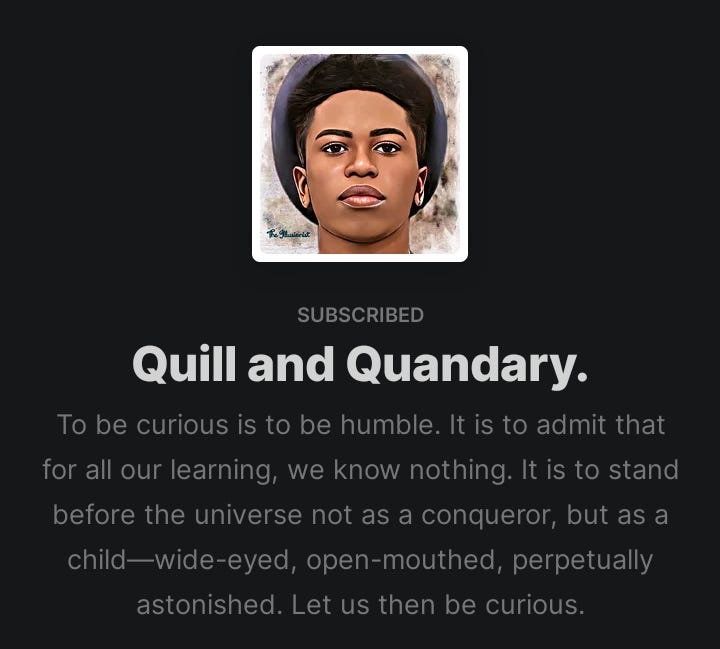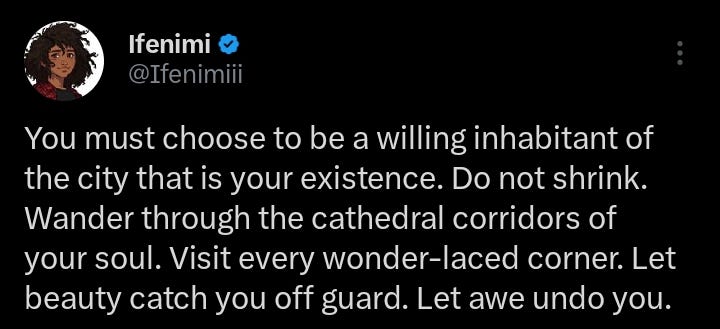
I once met myself beneath a jacaranda tree, just as the sun was tucking itself beneath the arms of the evening. I had not planned this meeting. It was one of those moments when the air forgets to lie and the silence speaks louder than thunder. I had sat with the hum of questions, the weariness of my breath, and the ache of eyes that had seen too much and understood too little. And then I saw a reflection, of a younger me perhaps, or the ghost of a self I had long abandoned. He looked at me with the question I had never truly answered: Who are you to you?
It is a strange thing, to live in a body for years and still be foreign to it. To walk in your own name, eat with your own hands, smile into mirrors, and yet not know the person whose bones carry your grief through this world. There are days I introduce myself to strangers with ease, but hesitate when the one I must greet is the man in the silence of my mind.
We are taught from the earliest age to become palatable. To dream in third-person and believe that performance is personality. School teaches us to measure our value in grades. Religion asks us to empty ourselves to be worthy. Society offers applause for versions of ourselves that barely survive the night. And so, many of us become adept at becoming everyone but ourselves.
I wore masks that clung to my skin like old perfume. I became what was needed—the listener, the achiever, the dependable friend, the quiet lover, the "man." My raw and untamed voice, was filed down to a whisper, and I praised myself for being digestible. I wanted so badly to be understood by others, I forgot to understand myself. I thought achievements could serve as substitutes for identity. I grew up brilliant, with the sharpness of mind that drew praise like bees to nectar. Academic excellence, accolades, awards. They felt like mirrors in which I saw myself clearly. But when I started failing at other things—like relationships, like navigating the fragile architecture of my emotions, those mirrors cracked. I began to feel like a fraud in the house I built with my own hands. Impostor syndrome curled into my bones and I could no longer tell where I ended and the fear began.
It’s an interesting thing, isn’t it?
For example, you spend your whole life being known for getting things right. The one who walks into a room with the quiet dignity of someone who doesn’t need to prove they belong. You start to believe that success is your nature, that winning is your default setting. And then, one day, you don’t get it right.
At first, it's quiet, but soon the silence becomes a siren. Something about the way your hands tremble when you reread the numbers. Something about how your breath slows when your mind refuses to accept what’s written. And then it hits. The disappointment. What's crazier is that it isn't just personal, it etches itself into your soul.
You beat yourself up in a thousand different ways. Not all of them obvious. Sometimes it's in the way you smile too quickly in conversation. Sometimes it’s in the way you reread messages, looking for blame in anything, everything. Sometimes, it’s simply in the way you avoid your own reflection.
But that's not even the worst part.
You see, now you must face the crowd of your never-appointed appointees. You hear it in their voices. The first “No wayyy” goes hard. You don’t know what stings more, the disbelief or the disappointment hiding behind it. Then comes the “You’re lying,” as if failure were too obscene to be spoken aloud. Well, to be fair, it was. And finally, the cruelest of all: “Tell me you’re joking.” Do you see me in a blue shirt, and a black trousers? Are there any cameras and LEDS around? Have you perhaps come across anything like Wasabi in my initials?
Listen, failure, or even just a subtle deviation from your constant, does something unspeakable to you. It tugs at the very threads that hold your identity together. It doesn't just hurt, it disorients. Suddenly, the self you once wore like a tailored garment becomes ill-fitting. You become hesitant, cautious. You look over your shoulder in rooms where you once walked in with ease. You speak less. You explain more. You become someone else. Me? I stuttered more often. I never stutter.
It nudges you to the edge of an abyss you didn't even know existed. And if you're not careful—if you're not merciful with yourself—you fall. And even if you don’t fall, you dangle long enough to forget what standing felt like.
And then, there were the women. I have let some of my personal relationships, especially, the women I’ve loved define me. Each of these beautiful creatures offered me a lens, a mirror, a script. I saw myself through their eyes, contorting and adapting, morphing into versions of myself that made sense to them. I wanted to be chosen so badly that I became what I assumed they were searching for. I walked on emotional stilts, I grew taller in the presence of their approval and crumbled when their gaze drifted. It was barely love. It was mostly self-erasure dressed as romance. In their absence, I struggled to remember my own silhouette. It sounds clear now, but it never was.
You see, I’d apologize too fast. It is beneficial to avoid conflicts, but it becomes detrimental to you when it is always at the expense of your self respect. Everything is a threat to you, because you cannot imagine an experience without them. I thought I was growing into them, I was in fact, shrinking into them. I was folding myself into the smallest, softest version I could be, just to fit into the spaces they offered me.
Love is not supposed to cost you yourself.
You must love. But you must love healthy. There must be room for yourself to truly thrive. You deserve that. You always have.
No one tells you that one small fracture, one fuckup, one stumble, one slight misalignment, can try to redefine your whole trajectory. They don’t warn you that a single bad chapter can start narrating the rest of your story if you hand it the pen. And getting out of that mental quicksand? That takes more than time.
I know because it is my experience.
Five years ago was when I had my epiphany. It was not lightning nor fanfare. It came in the quiet, the morning after a heartbreak, when I stared at the ceiling too long to pretend I was sleeping. Usually, I'd have been seriously disturbed by being "dumped," but this time, something, I don't know what, said, “You can’t keep outsourcing your definition." That moment didn’t particularly heal me, but it did break something open. I began the long, uneven walk inward. I started asking myself the kinds of questions that made my chest heavy. Not "What do you want to become?" "Who are you?" but "Who have you already been pretending to be?"
The body always remembers. It stores the self you buried beneath expectations, and it haunts you with its quiet pleas. In the middle of laughter, a sob rises unprovoked. In the arms of another, you long for your own embrace. You find yourself scrolling through pictures of a childhood you barely remember, hunting for evidence that you were once whole. You forget birthdays, but remember pain with astonishing clarity. That is how the self speaks—in stutters of longing, in the syntax of dreams.
And so I return to the question: Who are you to you?
Are you a caretaker of your soul, or its jailer? Do you write yourself love letters or eviction notices? Have you danced with your wounds, or merely pretended they do not exist?
I am slowly learning that to answer this question is not an event, but a discipline. I return daily to this cracked mirror and offer it kindness. You have to hold the parts of yourself that do not make sense and whisper, "You still belong." You have to stop waiting for someone else to make you feel real. You have to stop waiting for someone else to make you feel seen.
There is no institution, no title, no lover, no religion that can know you on your behalf. You must sit with your contradictions. You must ask why you are afraid of being alone, or why silence makes your heart race. You must watch the way you flinch when complimented, or the way your voice shakes when you advocate for yourself. These are not flaws. They are portals. Through them, the self emerges.
I am a memory and a becoming. I am the echo of every version of me that did not survive, and the song of the self that refused to be erased. I am the diary that remains locked because even I am not ready to read its pages. I am tenderness in the midst of rage. I am laughter in the teeth of despair. I am not perfect, but I am mine.
So who am I to me?
I am the story I have not yet finished writing. The God I am learning to believe lives in me too. The breath that still prays even after faith has wavered. I am not an answer. I am the beautiful, stubborn question.
And for now, that is enough.




This is more than writing. It’s an unearthing. And reading it felt like someone whispering, “I see you,” in a way I didn’t know I still needed. I relate. Not in the polite, nodding, “Oh that’s familiar” kind of way, but in the raw, guttural sense of "I have lived this." Every paragraph pulled at a version of me I’ve tried to bury or ignore or perform over.
I’ve been the overachiever applauded for my resilience, even as my inner world crumbled quietly under the weight of expectations—others' and my own. I’ve been the shapeshifter, molding myself into what others needed, wanted, expected... until I could no longer recognize my own reflection in silence.
I have loved from a place of fear, of absence, of a desperate hunger to be seen and chosen. And in doing so, I have shrunk. Folded. Disappeared. I have danced so carefully around people’s comfort that I forgot what my own rhythm felt like. And when the applause stopped, or the relationship ended, or the failure came, I was left staring into a void I couldn't name.
Thank you, truly, for articulating the ache so many of us carry. For putting language to what often stays unnamed. For reminding us that becoming ourselves is not a destination—it’s a daily, courageous act.
I’m still learning to sit with my mirror, even on the days the reflection shakes. But now, I’ll try to greet her more gently. Maybe that's where "being better" begins.
I wish I had the words to convey the visceral response I had while reading this. At too many points, I would stop, put a fist to my mouth and nod even as tears sprang up to my eyes. I don’t think I can equate that experience with words yet. Maybe after my fifth or sixth read. Until then, thank you. For writing and sharing, thank you.